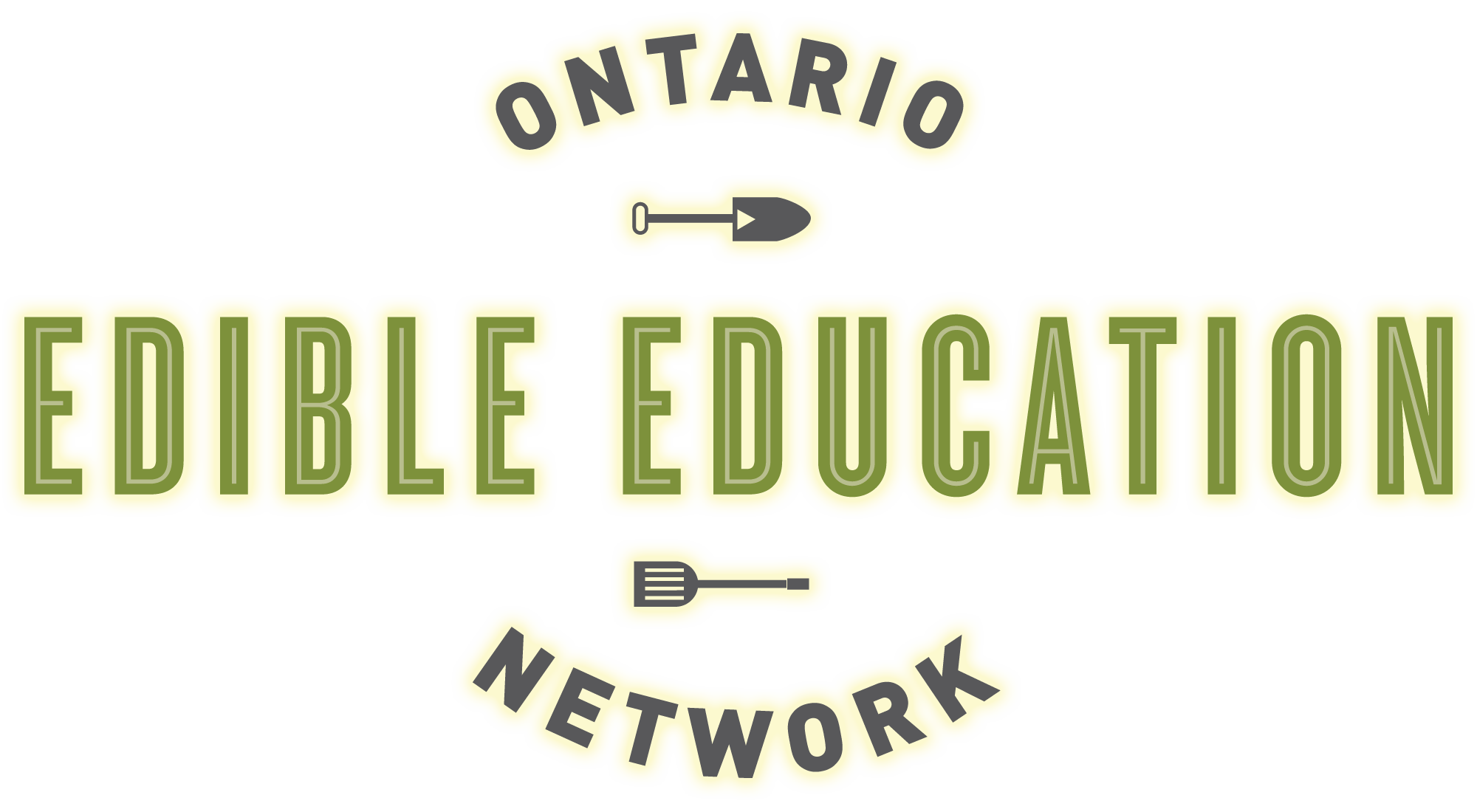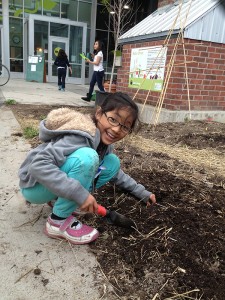Network Activities
Network Action Plan
Since January 2012, the Network has been taking steps to better understand and identify actions to support all of you who are working with children, youth, and healthy food systems.
Summary of priority actions:
The following summarizes our current priorities for action (more info is available under the summary).
** Section numbers refer to those in the comprehensive Action Plan
1) Advocacy:
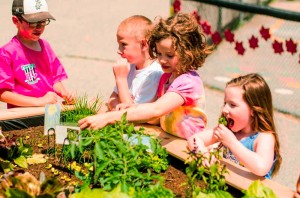
Passionate about parsley at James Robinson P.S., Markham, the first Seeds For Change school garden in York Region. Credit: Lynne Koss.
- Campaign for Universal Student Nutrition Program with a strong food literacy focus (build on Healthy Kids Strategy recommendations 2.8 and 2.9) (C.1.1)
- Advocate for the Government of Ontario to recognize school gardens as important places for food literacy (C.1.3)
- Advocate for cooking and food skills programs to be made accessible to all Ontario children (C.1.4)
2) Information Sharing and Coordinated Action:
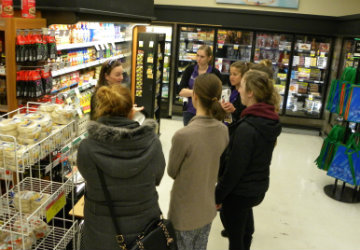
Ontario Agri-Food Education’s (OAFE) Teacher Ambassador (TA) Program™ is run by Ontario Certified Teachers. TA’s deliver FREE lessons to grade 7-12 classes and facilitate events like Ag in the Aisles™ (as seen above). Visit www.oafe.org
- Share organizations’ stories, successes, challenges, and contacts using the Network website and newsletter (see A.2.1, B.1.2, B.1.5, B.1.7, B.1.9, B.1.11, B.2.1, A.1.4, A.1.2)
- Develop and promote a searchable directory of organizations that includes types of programs offered, skills and resources to share, opportunities for mentorship, and other directory information (see B.1.3)
- Coordinate the development of local food action hubs among community organizations that have delivered local food in schools projects (A.1.9)
3) Resource Development:
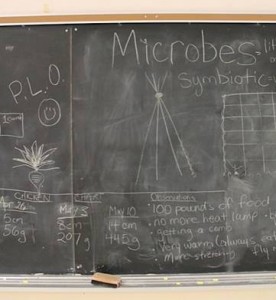
A lesson on soil for the Farmers in the Playground program at Evergreen Heights in Emsdale. Credit: Kelli Ebbs.
- Develop a comprehensive snap shot of the state of student nutrition programs in Ontario with metrics and success stories (see B.1.13)
- Create and share resources for schools, parents, community members and organizations to use to advocate for food literacy programming and increased resources for SNPs (presentations, hand-outs, fact sheets, case studies, toolkits, videos, social media campaign, etc.) (B.4.1)
- Develop and implement (a) age-appropriate benchmarks and (b) a common evaluation tool for food literacy and food skills (see A.1.8, A.2.3, B.3.6, B.4.4)
- Compile scans on community and school gardens (in progress) (B.3.2)
- Compile updated scan on regional food hubs (in progress) (B.3.3)
- Prepare a tip sheet for community organizations to approach school boards (B.4.2)
- Develop a directory of outside-the-classroom food education programs that can be used by teachers (B.1.8)
- Prepare a factsheet of ‘how gardens impact the community’ to use in educating funders and in other communications efforts (A.2.2, B.4.3)
- Develop a list / point to existing lists of possible relevant grantors (B.1.6)
How we arrived at these priorities, and additional documents
In Phase 1 of our action planning process, we conducted an environmental scan and needs assessment (see a summary of responses to our preliminary survey from January 2012 – February 2013). In Phase 2 of our action planning process teams were selected to explore specific needs and opportunities relating to 6 priority areas of the network and to develop a network action plan (see our call for applicants for more information about the process). For the results of this process and what we heard see:
- Summary of Action Plan
- Full Action Plan (consolidating 6 themes below)
- Food in the Curriculum Action Plan (Full) | Summary
- Food Education Outside of the Classroom Action Plan (Full) | Summary
- School and Community Food Gardens Engaging Children Action Plan (Full) | Summary
- Food Skills and Cooking Programs Action Plan (Full) | Summary
- Local / Sustainable Food In Schools Action Plan (Full) | Summary
- Student Nutrition Programs Action Plan
All of these are living documents – they will change and evolve as the Network moves forward.
Contact:
We would love to hear your feedback, answer or your questions, or get you involved in helping us move this plan forward. To get in touch, please contact Carolyn Webb, Coordinator for the Ontario Edible Education Network: cwebb@sustainontario.ca.
Save
Save
Save
Related News on the Sustain Ontario Blog
-
Federal government announces historic investment in a National School Food Program!
“We can now say that Canada is joining the other G7 countries, and most countries in the world, in recognizing the importance of school food programs,” shared Sustain’s Carolyn Webb, who supports the national coordination of the Coalition for Healthy School Food, yesterday in Ottawa. Sustain Ontario joins the Coalition for Healthy School Food—alongside several […]
read more -
School Food Financing and Fundraising Webinar – Recording Up!
This event, held March 26, 2024, brought together experienced school food program providers from across Ontario for a knowledge-sharing event hosted by the Ontario Chapter of the Coalition for Healthy School Food (chaired by Sustain Ontario). This event was our second school food financing webinar. Check out the recording here. The event began with an […]
read more -
Call for Advisors – Nourishing Indigenous Food & Foodways in Schools
Farm to Cafeteria Canada, in partnership with Indigenous and non-Indigenous organizations including Sustain Ontario, is looking for around 10 community members from across Canada to join its Circle of Advisors to inform its Nourishing Indigenous Food and Foodways in Schools initiative. The partnership is looking for Advisors who can bring experience and/or interest in supporting […]
read more -
2024 Farm to School Canada Grants Now Open
In partnership with the Whole Kids Foundation, Farm to Cafeteria Canada is pleased to announce that they are launching their 5th cycle of the Farm to School Canada Grants program! Delivered directly to schools, the grants are valued at up to $10,000 each and are designed to bring more healthy, local foods into school communities. They […]
read more -
Congratulations to 2023/24 Seed Grant Recipients!
Farm to Cafeteria Canada has announced the first recipients of its new Dig In Seed Grants, with 9 grants to Ontario schools! These flexible grants, delivered in partnership with the Schad Foundation, provide a total of $75,000 directly to 27 schools across 9 provinces and 1 territory allowing them to jumpstart their farm and local […]
read more -
Webinar Series for Schools: Hydroponics & Indoor Growing
Farm to Cafeteria Canada, in partnership with Farm to School BC, is hosting a 2-part webinar series aimed at helping schools make the most of hydroponics and other types of indoor growing systems. This series will feature guest speakers from schools who will share their first-hand learning experiences from getting started to the impacts their […]
read more -
What We Heard Report on the National School Food Policy Engagements
On October 31, 2023, the Government of Canada released the What We Heard Report on the National School Food Policy Engagements. The public consultations that informed the report took place nearly a year ago and stakeholders across the country have been waiting to learn about the report’s findings. The What We Heard Report makes it […]
read more -
Food For the Future Podcast
On September 30th, Sustain Ontario’s Carolyn Webb was featured on the Food for the Future podcast to speak about the need for a national school food program. Earlier in the month the show also featured Alicia Martin, PhD student at Guelph University and co-author of Sustain Ontario’s policy brief to inform Bill 216 – Food […]
read more -
Ontario announces an additional $5 million for Student Nutrition Programs
On October 5, 2023, the Ontario government announced that it will provide an additional $5 million to the Student Nutrition Program (SNP) and First Nations Student Nutrition Program (FNSNP). This announcement was made by Minister of Children, Communities and Social Services Michael Parsa in recognition of the need to help more children and youth access […]
read more -
Sign the House of Commons Petition for a National School Food Program
The Coalition for Healthy School Food has initiated a House of Commons Petition asking the federal government to implement and fund a National School Food Program. Please sign the petition before October 20th! Please share the petition in your newsletters, on social media, and circulate the digital brochure. Together, we can improve the health and […]
read more
Explore Related Material from Sustain Ontario
-
Inspiration
-
By Theme
-
By Type
-
For Schools
-
Outside of School
